|
Facing the camera from left to right: Lt. Governor, Denny Heck; Former Representative, Jesse Wineberry; and Former Governor, Dan Evans. On August 27 the Washington Equity Now Alliance (WENA), a pro-affirmative action non-profit, organized a reenactment of the signing of Executive Order (EO) 72-07 in the Washington Legislative Building. Former Governor Dan Evans, soon to celebrate his 97th birthday, was on hand to reenact his historic signing of the EO that brought affirmative action to Washington State.
“Juneteenth has never been a celebration of victory or an acceptance of the way things are. It’s a celebration of progress. It’s an affirmation that despite the most painful parts of our history, change is possible—and there is still so much work to do.” — Barack Obama Juneteenth, also known as Freedom Day, serves as a day to reflect on our journey to freedom for Black people in America. As Washington State, along with the rest of the United States of America, seeks to celebrate Juneteenth as an official holiday, our community reflects on our history and the significance of Juneteenth in this country. Many Americans are unaware that enslavement of our people did not once the Emancipation Proclamation was signed by President Abraham Lincoln in 1863. It ended two years later in 1865, when more than 2,000 troops arrived in Galveston Bay Texas to enforce the freedom that belonged to black people. The impact of delayed action from a promise that was given and not fulfilled for 2 years is an all too familiar feeling. Post-emancipation, known as Reconstruction was an era consistently references as a period great hope yet struggle, and uncertainty for Black people in America. As the reality of black people being free started to settle in, we saw racism and oppression show up in a new form. Even though black people were no longer enslaved, they were faced with issues of Black Codes and Jim Crow, known as strict laws on how to treat black people. They were put in place to deprive and strip the fundamental rights and economic growth for the Black community. In addition to the corrupt laws in place, Black people were victims of horrendous acts by white supremacy believers, whose sole purpose was to terrorize the newly freed Black people anybody or entity that supported them. America has made progress, where the Black people are concerned but we as whole still suffer from the evil that America was built upon. It is systemic and must be purged. Reflection Juneteenth is not just a moment in American history, where we only celebrate the freedom for black people. It serves as a reminder of resilience and the determination that black people continuously show. We’ve overcome, we’ve endured, we do not break. However, we deserve rest, comfort, and peace. This is a moment in history, that highlights the long journey we have traveled. A moment in history, where our community can revive their hope and strength to build a better future for not only ourselves, but those that come after. So, let us not just a celebrate on Juneteenth, let us be inspired to act and commit to the effort of establishing a world where equality and inclusion does exist. Check out photos, live streams, and news links from Washington State Juneteenth event held on June 16th, 2022. Washington State Juneteenth Celebration Photos - BUILD, Washington State Juneteenth Celebration Livestream- TVW BUILD Facebook Livestream KING 5 News Photos taken by Gary Lott Compiled by Shauna James, Washington State Health Care Authority. What is Juneteenth?
Juneteenth Significance “Juneteenth” (June Nineteenth) commemorates freedom for African Americans, and reminds us of the promises of freedom, equity, and equitable opportunity which are at the core of the American Dream. The historical legacy of Juneteenth is a good mirror of how freedom and justice in our nation has always been “delayed” for Black people. For decades waves of lynching, imprisonment, and Jim Crow laws took root. This resulted in a disproportionate impact of discriminatory policies, disparities, and a lack of economic opportunity and investment. While some progress has been made, considerable barriers still exist towards fuller equity. Thus, the importance of the recognition and observance of Juneteenth to demonstrate our commitment to diversity, equity, inclusion, and belonging The Historical Legacy of Juneteenth (June Nineteenth) 1502: The first known Transatlantic Slave Trade voyage - At least 10 million Black people were forcibly transported from Africa and sold into slavery. January 1, 1863: President Abraham Lincoln issues the Emancipation Proclamation, but some Confederate states refused to enforce this law. June 19, 1865: General Gordon Granger arrives in Galveston, Texas and announces that more than 250,000 enslaved black people were free through the Emancipation Proclamation). December 1865: The 13th Amendment to the U.S. Constitution is passed, freeing all enslaved people & abolishing slavery in the U.S. June 7, 1979: Representative Al Edwards introduces a bill declaring “Juneteenth” a state holiday - Texas was the first state to recognize the observance. June 17, 2021: President Joe Biden establishes Juneteenth, the date commemorating the end of slavery in the U.S, as a federal holiday. Key points of Governor Inslee’s Juneteenth Proclamation In his all-state communication, Governor Jay Inslee said recent events caused him to examine how persistent racism continues to impact people of color in the State of Washington, but worldwide. The proclamation is aimed at recognizing contributions of African Americans to our state and country and as a chance to reflect on progress till to be made to endure equal access and opportunity and for self-improvement and planning for a more equitable future. Juneteenth commemorates African American freedom, acknowledges the resilience and determination that African Americans have shown. Since its origin in 1865 in Galveston, Texas the observance of June 19 (Juneteenth) as the African-American Emancipation Day has spread across the US and worldwide. In his communication about the proclamation, he made a commitment to making Washington a more inclusive state and our workplace an environment where every employee is encouraged to bring their true and authentic selves to work. The proclamation makes Juneteenth a legal holiday. He urged ALL citizens to learn about the celebration and its significance in American History and the heritage of our nation. The Juneteenth Flag
On June 19th you might start seeing another red, white, and blue flag flying over our state. That banner with a star bursting in the middle is the Juneteenth Flag, a symbol of the end of slavery in the United States. The flag was created in 1997 by Ben Haith, founder of the National Juneteenth Celebration Foundation (NJCF). According to Haith the design was a deliberate process. Here’s what each element of the flag represents:
The 2022 National Women’s History Theme: “Women Providing Healing, Promoting Hope” Since 1995, presidents have issued a series of annual proclamations designating the month of March as “Women’s History Month.” These proclamations celebrate the contributions women have made to the United States and recognize the specific achievements women have made over the course of American history in a variety of fields.
The 2022 Women’s History theme, “Providing Healing, Promoting Hope”, is both a tribute to the ceaseless work of caregivers and frontline workers during this ongoing pandemic and also a recognition of the thousands of ways that women of all cultures have provided both healing and hope throughout history. This year, in particular, we are reminded of the importance of healers and caregivers who are helping to promote and sustain hope for the future. The NWHA encourages communities throughout the country to honor local women who bring and have historically brought these priceless gifts to their families, workplaces, and neighborhoods, sometimes at great sacrifice. These are the women who, as counselors and clerics, artists and teachers, doctors, nurses, mothers, and grandmothers listen, ease suffering, restore dignity, and make decisions for our general as well as our personal welfare.
2022 marks the 50th anniversary of the passage of the Title IX of the Education Amendments of 1972, a landmark piece of legislation for gender equity. The law ensures that all education programs and activities receiving federal funding must protect students and employees from sex-based discrimination and bans many aspects of gender inequality that had previously been tolerated or overlooked in education. Despite consistent attempts through legislation, executive actions, and lawsuits to diminish its effectiveness, Title IX continues to provide these protections today. The 2022 National Women’s History Theme Women's History Month.gov Women’s History Month 2022: Celebrating 50 Years of Title IX International Women's Day.com Compiled by BUILD for Women's History Month, 2022. Content compiled by The Washington State Department of Veterans Affairs (WDVA). Despite their constant presence in even the earliest iterations of the nation’s armed forces, the service of a Black individual has only recently been measured equally against that of a white servicemember. Though more visceral and violent acts of discrimination may have greatly diminished in our modern era, there’s still advancement to be made.
Around 9,000 Black soldiers served during the Revolutionary War, many of whom were slaves enticed to enlist with the promise of freedom, only to find themselves forced back into bondage after the close of the conflict. During the Civil War, the Black servicemen of the Union were treated in different wards than the white soldiers. These wards were poorly staffed and undersupplied, leading to many Black soldiers dying from wounds that white soldiers would survive. The Confederate Army used both free and enslaved Black people for labor and menial tasks but refused to enlist them as combat infantry. BUILD recommends the following resource as we celebrate Black History Month, 2022. From the video description: "It's February, so many teachers and schools are taking time to celebrate Black History Month. According to Stanford historian Michael Hines, there are still misunderstandings and misconceptions about the past, present, and future of the celebration. In this installment of Tiny Lectures, Hines talks about the beginnings and evolution of Black History Month. Michael Hines is an assistant professor at the Stanford Graduate School of Education. He teaches courses on the history of education, and specifically the history of African American education, in the United States." Tacoma, WA – Black History Month is an opportunity to explore the achievements and contributions of Black Americans in our past and honor those in our present. You can explore stories and make connections through online and in-person activities with the Washington State Historical Society (WSHS), including:
Born in Atlanta, Georgia, Reverend Dr. Martin Luther King Jr. (January 15, 1929 - April 4, 1968), was a man of great integrity, values, and principles. If alive today, Reverend Dr. King would be 92 years old. Leading the effort toward social justice and equality, Reverend Dr. King’s impact went beyond his local community to inspire change in America and the world. In 1964, he was awarded the Nobel Peace Prize.
BUILD was present to witness the unveiling of the George Bush monument at the Capitol Campus on November 19. Though cold and overcast, dozens watched as remarks were given by members of the Washington State Historical Society, Representative Debra Entenman, and former Representative Eric Pettigrew. Read about WSHS’ efforts to highlight Black history in Washington State Read the WSHS press release about the George Bush monument Read more about the monument on the DES website BUILD was present to live stream the event on Facebook Original posting:
Please join Washington State Historical Society for the unveiling of a NEW MONUMENT on the capitol campus celebrating the life and contributions of pioneer GEORGE BUSH and his FAMILY November 19, 2021 Remarks begin at 12 noon, rain or shine–bring an umbrella! |
AuthorSOur blog includes but is not limited to events, insights, and highlights to augment basic education. Archives
July 2024
|
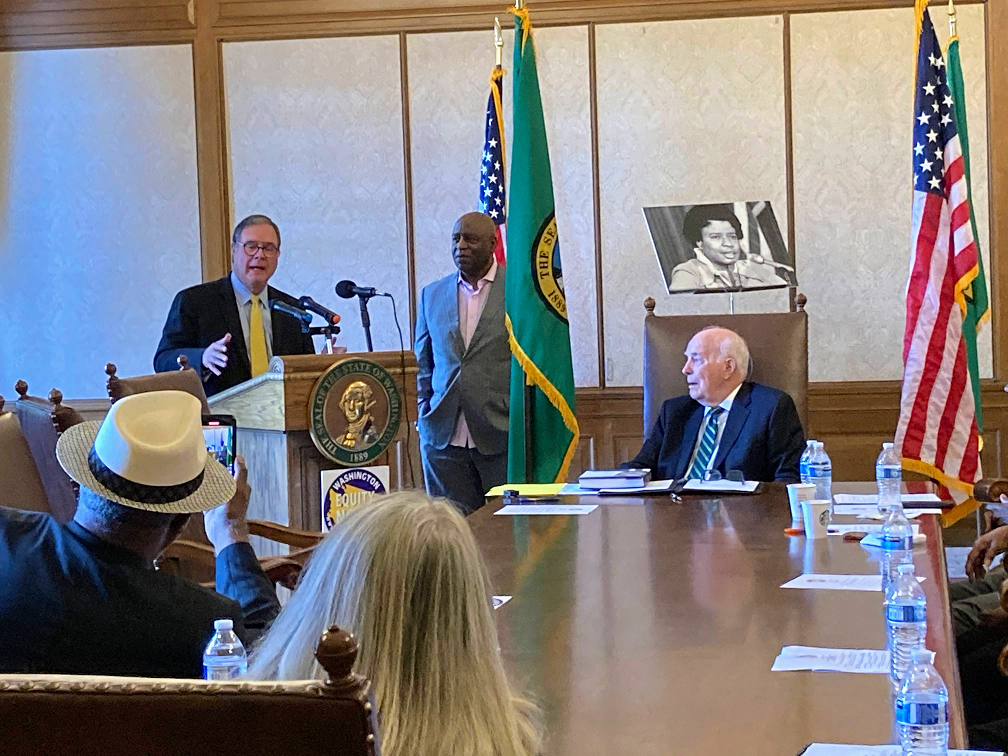





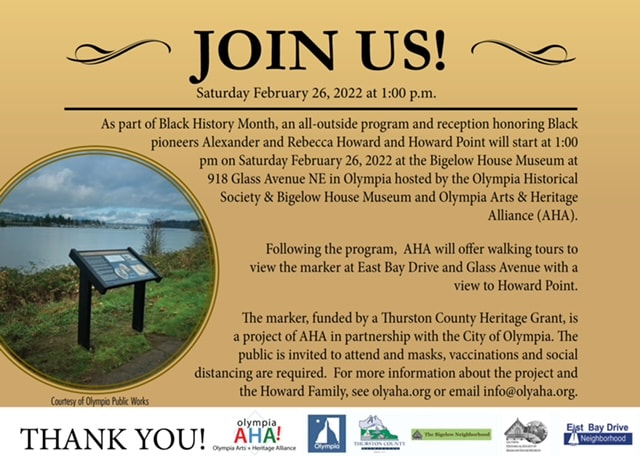

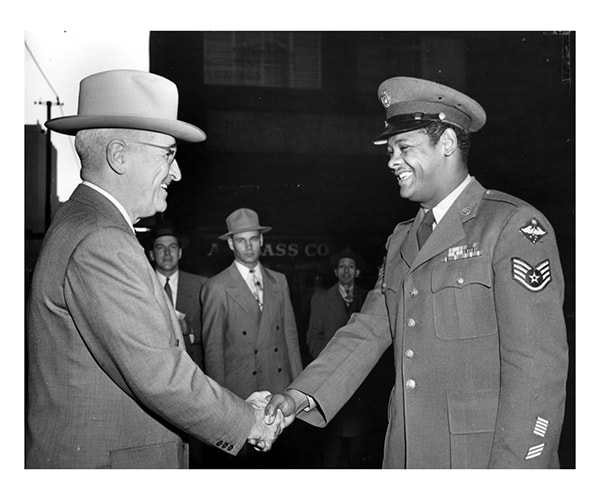

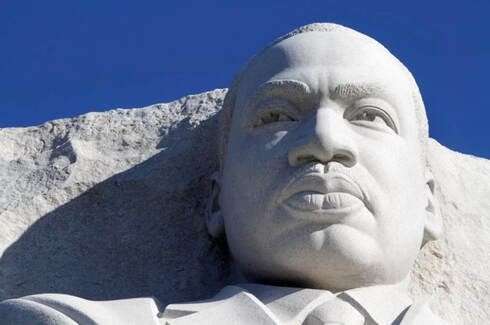
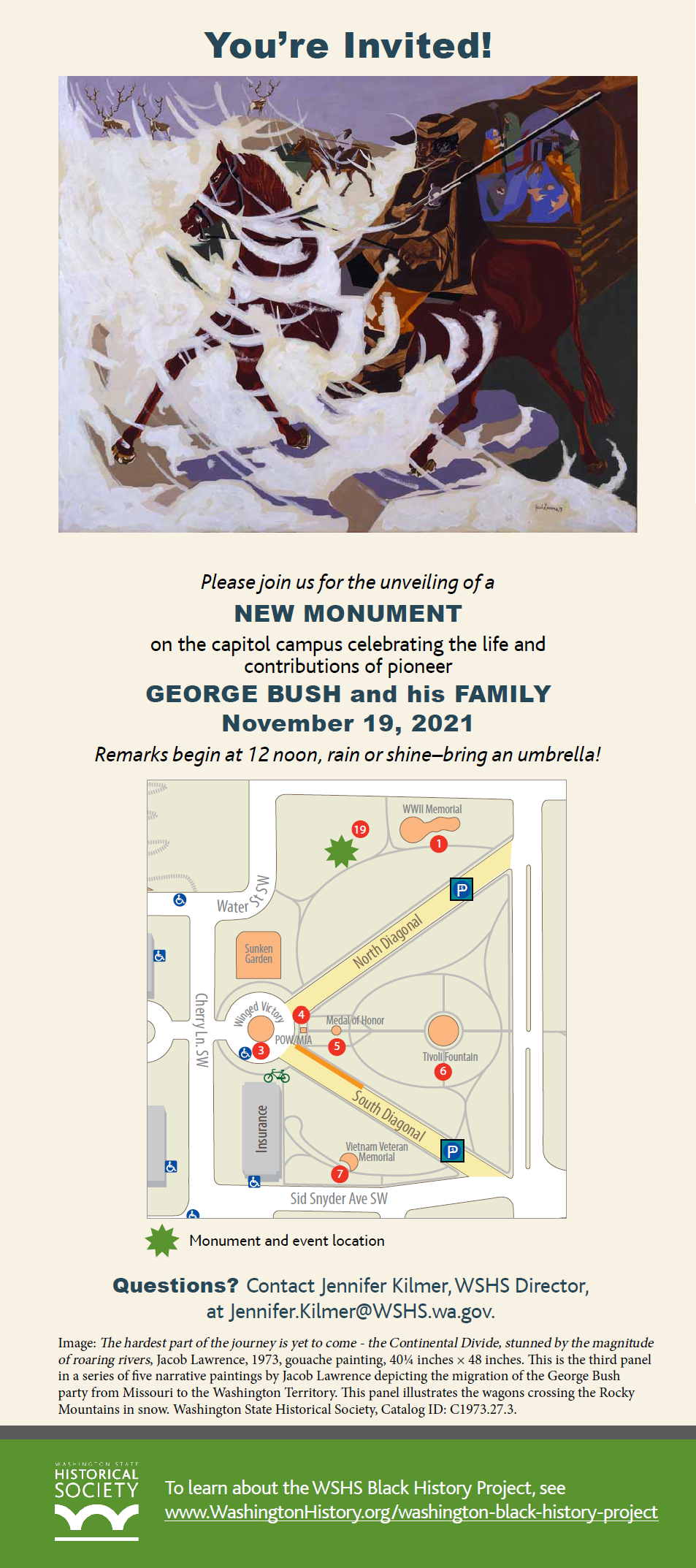
 RSS Feed
RSS Feed